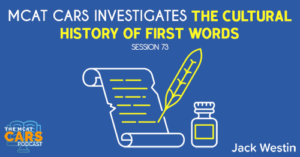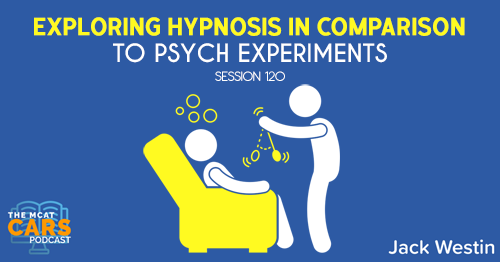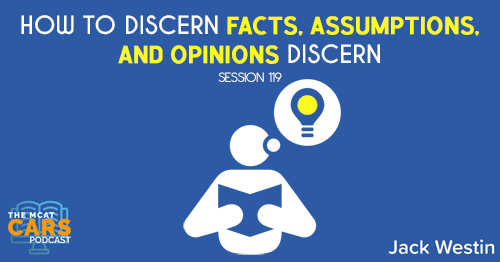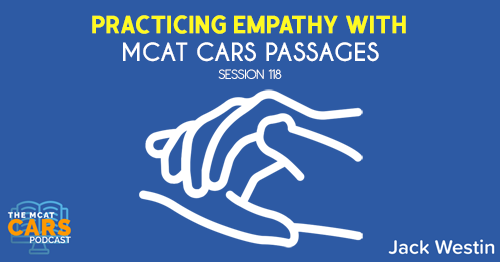Apple Podcasts | Google Podcasts

Session 73
Using our CARS skills, we’ll look at the cultural significance and history of first words. What types of questions might students see from this passage?
Jack Westin helps us drill another passage to help you ace your CARS section on the MCAT. If you want some more in-depth experience, check out their free trial session. His sessions are done once a week. Schedule in advance as classes can get filled pretty quickly.
See how their online course works. Get to interact with Jack live and go through a passage together. Do questions together using the very foundational skills that he teaches in the course. It’s an opportunity for students to really learn how simple this test can be. It also allows you to understand how he teaches and see if the course is for you.
Listen to this podcast episode with the player above, or keep reading for the highlights and takeaway points.
Link to article:
https://www.theparisreview.org/blog/2019/07/26/a-cultural-history-of-first-words/
A baby’s first word seems as if it ought to be universally fascinating. Laden with the promise of a new life, a first word is a new person’s first expression of self, even if it’s just to label the dog, ask for food, or say hi. First words are more than cute; they’re existentially profound. They represent the threshold where noise becomes signal, the moment that interiority breaks its confines to greet the outside world.
And yet, for much of history, infant language wasn’t regarded as worthy of attention, and in many contemporary cultures it still isn’t. All babies, across time and space, transition from babbling to language at about twelve months of age, in spoken languages as well as signed ones, but not all parents and caregivers pay attention to that transition. That supposedly irresistible thing we call a “baby’s first word” is a romanticized milestone, shaped by social and economic circumstances, and it is surprisingly recent. The natural state of first words is to be disregarded, misheard, or entirely overlooked. Doting over them isn’t perverse—it’s just a modern, underappreciated luxury.
I was inspired to attempt a cultural history of “first words” by Germanist Karl Guthke, who wrote a definitive book about last words in the early nineties. He saw them as artifacts of each era’s conception of death. “There are styles of dying,” he noted, “so are there corresponding styles and fashions of last words?” In an aside, he dismissed first words, arguing they couldn’t tell us much about individual lives. They belong, he wrote, “with anecdotes of childhood, whose biographical value is inversely proportionate to their charm.” He had been musing on 1988 U.S. presidential candidate Michael Dukakis whose reputation as a cold fish technocrat seemed to have been predicted by his alleged first words, in Greek: monos mou, or “all by myself.”
But first words, from the semiformed babble to the perfectly adult, have a tremendous amount to tell us about society. There are “styles and fashions” to first words, just as there are of last words, in the sense of what gets heard, recorded, or passed down. More importantly, the emergence of an interest in first words tracks closely with how Western industrialized societies became what anthropologist David Lancy calls “neontocracies,” or societies organized around the imperatives of caring for the very young. If you want to know how and why babies became their parents’ cognitive projects, tracking what those parents made of first words is a good metric.
In the cultural history of first words, we can say with confidence that they’ve always existed. But early utterances are rarely mentioned in historical materials. When they are recorded, it’s mainly been in more modern media, such as baby books, diaries, and scientific observations. By contrast, last words appear as far back as the Old Testament. The first recorded first word, were it to be found, would be a marker of modernity’s dawn.
[03:48] Paragraph 1, Sentence 1
A baby’s first word seems as if it ought to be universally fascinating.
Jack says:
We’re talking about babies and the first word they speak.
[04:00] Paragraph 1, Sentence 2
Laden with the promise of a new life, a first word is a new person’s first expression of self, even if it’s just to label the dog, ask for food, or say hi.
Jack says:
The author is pointing out that a baby’s first word is this big expression of self. This is conceptually difficult to understand.
'The expression of self is so philosophical and that could scare students.'Click To TweetDon’t worry too much about this. Just try to get an idea for where the author is going with this. The author is trying to emphasize it’s important. And you can get that sense without articulating it. You don’t need to be able to suggest that to yourself before you keep reading. But at least, get that sense.
[05:17] Paragraph 1, Sentence 3
First words are more than cute; they’re existentially profound.
Jack says:
Baby’s first words are really a big thing for people.
[05:48] Paragraph 1, Sentence 4
They represent the threshold where noise becomes signal, the moment that interiority breaks its confines to greet the outside world.
Jack says:
It’s profound how the noise is stuck in your head for some time and then all of a sudden, you can speak to people.
[07:10] Paragraph 2, Sentence 1
And yet, for much of history, infant language wasn’t regarded as worthy of attention, and in many contemporary cultures it still isn’t.
Jack says:
The history lesson is that we really didn’t care about the baby’s first words and their language. So the author wants to make sure that we understand this is important.
[07:47] Paragraph 2, Sentence 2
All babies, across time and space, transition from babbling to language at about twelve months of age, in spoken languages as well as signed ones, but not all parents and caregivers pay attention to that transition.
Jack says:
Again, we’re given a lesson here of when babies start to speak, be it spoken language or signed language. But not all parents and caregivers pay attention to that transition. The author is painting the picture that it’s not important.
[08:47] Paragraph 2, Sentence 3
That supposedly irresistible thing we call a “baby’s first word” is a romanticized milestone, shaped by social and economic circumstances, and it is surprisingly recent.
Jack says:
The history lesson for the baby’s first word and how we romanticize it, making it bigger than we think it is is a new thing. So back then, it’s not so important. And now, we’re transitioning to today where we’re making it a big of a deal.
[09:25] Paragraph 2, Sentence 4
The natural state of first words is to be disregarded, misheard, or entirely overlooked.
Jack says:
The author is emphasizing this external pressure whether social or economic. For social, you want to tell the world that it’s your baby’s first word. You can take what it is you can just pass through this as long as you understand that we’re not accustomed to caring about the first words.
[10:54] Paragraph 2, Sentence 5
Doting over them isn’t perverse—it’s just a modern, underappreciated luxury.
Jack says:
We, as a society, have come to a place where we have the mental bandwidth and safety and security to think about that kind of stuff when we’re not worried about survival.
[11:23] Paragraph 3, Sentence 1
I was inspired to attempt a cultural history of “first words” by Germanist Karl Guthke, who wrote a definitive book about last words in the early nineties.
Jack says:
The author was inspired to look at first words because of a book about last words. It is hard to read the sentence. But it’s important to go slow and pay attention to exactly what the author is saying.
It’s a mental twist. So it takes a little bit longer to absorb this. When you read these kinds of sentences, visualize them.
'Always visualize everything you read. But don't predict. Don't guess. You have to pay attention.'Click To TweetJust looking at words can be easy to misinterpret what the author is trying to say and that can lead to a lot of mistakes.
[12:53] Paragraph 3, Sentence 2
He saw them as artifacts of each era’s conception of death.
Jack says:
The author is talking about this Germanist author about last words and what they’re associated with.
[13:08] Paragraph 3, Sentence 3
“There are styles of dying,” he noted, “so are there corresponding styles and fashions of last words?”
Jack says:
The Germanist author is talking about styles of dying and how those last words are part of death and what death looks like in each era. Do those words change because death changes?
[13:36] Paragraph 3, Sentence 4
In an aside, he dismissed first words, arguing they couldn’t tell us much about individual lives.
Jack says:
The author of the article is now stating that this Germanist author about last words actually talks about first words and said they aren’t important.
Notice what the author did. He took that as inspiration to learn more about it. This can tell you more about how CARS works.
When you’re reading, you don’t have to believe what the author is saying. As long as you understand what the author is saying, you can start debating it and believing whatever you want to believe.
But when it comes to answering questions, you have to pretend you’re the author. Don’t bring in your perspective and your biases when you’re answering questions.
'When it comes to answering questions, you have to be the author. You have to pretend you're the author.'Click To TweetThis is similar to how the author is saying that the baby’s words are underappreciated. It’s something that’s like a luxury.
The students who are confident are able to debate the author. When you’re not confident in your reading, you’re just looking fo things. What is the author saying? Everyone can understand what the author is saying.
'It just comes down to how confident you are, how carefully you read, and are you willing to engage with the author.'Click To Tweet[15:30] Paragraph 3, Sentence 5
They belong, he wrote, “with anecdotes of childhood, whose biographical value is inversely proportionate to their charm.”
Jack says:
The author is talking about the Germanist author again. It’s hard to keep both authors in mind with what’s going on. The Germanist author is about why first words aren’t important. It’s basically saying the cuter it is, the more charming it is and the less valuable it is. It suggests that baby words that are typically charming have their little value.
[16:24] Paragraph 3, Sentence 6
He had been musing on 1988 U.S. presidential candidate Michael Dukakis whose reputation as a cold fish technocrat seemed to have been predicted by his alleged first words, in Greek: monos mou, or “all by myself.”
Jack says:
We’re given an example here that the Germanist author wrote about a presidential candidate and his apparent first words. The author brings this up to suggest that maybe first words can tell us something. This potentially inspired him to look into baby words or first words more.
[17:26] Paragraph 4, Sentence 1
But first words, from the semiformed babble to the perfectly adult, have a tremendous amount to tell us about society.
Jack says:
The author is switching back to their point of view that first words aren’t important and can tell us something.
[17:44] Paragraph 4, Sentence 2
There are “styles and fashions” to first words, just as there are of last words, in the sense of what gets heard, recorded, or passed down.
Jack says:
The author is telling us there are styles and fashion similar to the last words that the Germanist author wrote about.
[18:06] Paragraph 4, Sentence 3
More importantly, the emergence of an interest in first words tracks closely with how Western industrialized societies became what anthropologist David Lancy calls “neontocracies,” or societies organized around the imperatives of caring for the very young.
Jack says:
Now there’s a switch with the Western society caring more and more about babies. So you don’t even know what that term means. But as long as you understand that societies are focused more on the very young, you’re good.
[18:40] Paragraph 4, Sentence 4
If you want to know how and why babies became their parents’ cognitive projects, tracking what those parents made of first words is a good metric.
Jack says:
The switch into caring more and more for the young and tracking that first word is a good metric to see culture and society and how all that was changing.
It seems that as society becomes more modern, the babies’ first words become more important. It’s very similar to how this other German author was looking at older or the last words of an individual.
[19:30] Paragraph 5, Sentence 1
In the cultural history of first words, we can say with confidence that they’ve always existed.
Jack says:
There’s always a first word when we have language.
[19:45] Paragraph 5, Sentence 2
But early utterances are rarely mentioned in historical materials.
Jack says:
The author is pointing out that we’ve always had first words but nobody really talks about them.
[19:58] Paragraph 5, Sentence 3
When they are recorded, it’s mainly been in more modern media, such as baby books, diaries, and scientific observations.
Jack says:
The author points the fact that this is more of a new thing.
[20:11] Paragraph 5, Sentence 4
By contrast, last words appear as far back as the Old Testament.
Jack says:
It’s a good contrast there that it’s written about writing a historical material as the last words.
[20:22] Paragraph 5, Sentence 5
The first recorded first word, were it to be found, would be a marker of modernity’s dawn.
Jack says:
This is a hard sentence. Just look for that part that makes sense to you like “modernity’s dawn.”
The author here is saying that if we can find where we can start tracking first words, that’s kind of where modern society started as we know it. This is pointing back to the whole luxury stuff that was talked about earlier.
[21:05] The Main Idea
Somehow, focusing on baby words is something that only advanced or modern kinds of civilizations do.
Another point that the author tries to make throughout this passage is that this is telling us a lot about ourselves, about who we are, and where we’re going.
[21:42] Contrasting Two Authors in a Question
Jack thinks the questions for this passage would be way harder. Most students would have a challenge with the questions for this passage.
Here’s a possible question the MCAT could ask: What would the author believe most people in the 19th century’s perspective on the babies’ first words? They would basically ask you what’s the normal way of looking at a babies’ first words. And you would have to know that it’s not positive. They overlook it.
So the hard part about this is what the author believes and what other people would believe. Obviously, the author thinks that baby words are important. That is a sign of how modern we’re becoming.
You should also understand the perspective of everyone else. The German author and the people back in the day writing the Old Testament. All these things have to be taken into account. Depending on how the question is worded, one is more important than the other.
If the question is what could you assume about what people back in the day would believe or write, then you should know it’s not good towards baby language. You just have to keep everything straight in your mind and you could answer anything.
Links:
Link to article:
https://www.theparisreview.org/blog/2019/07/26/a-cultural-history-of-first-words/
SEARCH SITE
SEARCH SITE
LISTEN FOR FREE











